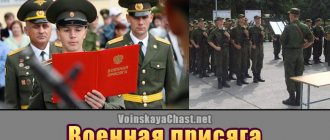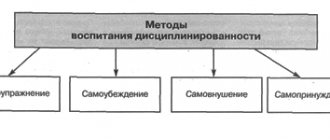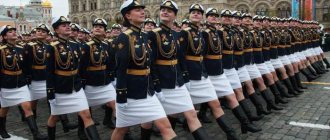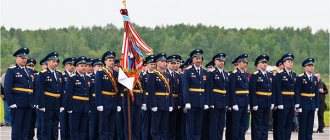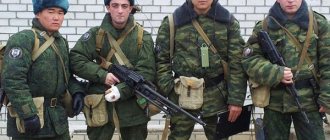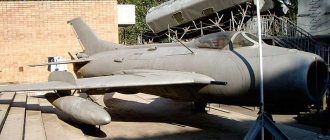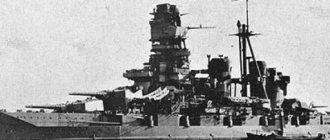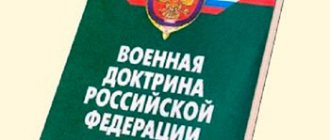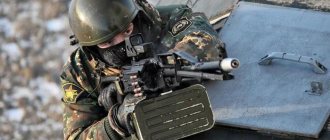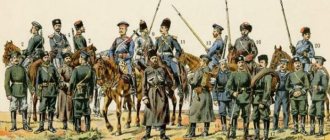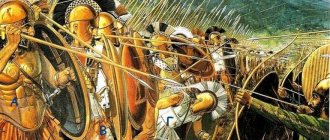06/08/2018 Category: Useful articles
- 2 Preparation for the military oath
- 3 Military oath ritual
- 4 Text of the oath
- 5 Dismissal and privileges after taking the oath
- 6 Conclusion
The realities of life for men in the Russian Federation are such that sooner or later they all face the same issue - the army. Yes, it would probably be difficult to find a young man who would not be concerned about this topic. Many are afraid to go to serve, others do not want to serve because of their convictions. There are also those who, on the contrary, strive to get into the armed forces and get the opportunity to prove something to themselves, or even make their homeland better. Be that as it may, everyone who, sooner or later, may encounter it, should know about the peculiarities of the internal structure of military service. Let's start with the very first significant event that awaits the future fighter - the oath.
Before taking the military oath
They take an oath to serve the Russian Federation, of course, not at the very beginning of their service. Before this, the recruits are prepared under careful supervision for this significant event. First of all, it is worth dispelling all false opinions regarding how long after the start of service the oath is taken. This does not happen in a week, as many are accustomed to thinking. Officially, a soldier is sworn in only upon completion of all the training required for him, a full study of his job responsibilities, the letter and spirit of the regulations, and many other concepts that he will need in the future.
If you have not yet read the article about the first days in the army, then we recommend reading - First day in the army
However, you cannot wait longer than two months, and by the end of this period the soldier is obliged to do everything necessary. As a rule, by this day the conscription has already ended, and the units are sufficiently equipped. We must remember that it is impossible not to perform the ritual under any pretext! From the moment he enters the service, a conscript can no longer enjoy the same freedom of choice as in civilian life. If you do not follow the orders of your commanders, life will not become easier, but, on the contrary, it will become more difficult. Extra outfits and jogging around the parade ground will take away that little personal time that conscripts so lack. The young recruit is completely at the disposal of the state (represented by the commander), so any disobedience will be met with severe punishment.
Drill training before taking the oath
From the history
The Russian land has undergone a lot on the path of its formation. The history of the Russian people was accompanied by a fierce struggle for national independence. Rus' was constantly threatened by enemies - steppe nomads, Tatar-Mongol hordes, dog knights, pashas and khans. But the Russian people have never been broken. In epics and songs, the people glorified their intercessors - warrior-heroes who went from all over Rus' to the capital city of Kiev to serve their Motherland. Military and combat traditions were actively developing and strengthening in Rus'. Gathering under the banners of battle to stand up for the Russian land, to take revenge on the filthy for their insults and ruin, the soldiers swore an oath of allegiance to the intercessor prince.
The warriors of Alexander Nevsky, Dmitry Donskoy, and the militias of Kuzma Minin and Dmitry Pozharsky fulfilled their oath with honor. The glory of their military exploits has not faded over the centuries. Further, it is important to note that in the first Russian military “Charter of military, cannon and other matters relating to military science,” the ritual of taking the oath of allegiance to the Tsar was enshrined. Every military man, the charter said, must be kissed on the cross - take an oath to the sovereign “to serve faithfully and be obedient and submissive in everything and do everything according to his command.” Every oath breaker was proclaimed not only an oathbreaker, but also an apostate, since, by kissing the cross, he took God as a witness of his loyalty and devotion to the king. Then we should recall Peter’s military regulations, which noted that victory is brought by “good orders, brave hearts, good weapons,” and paid attention to the development of such qualities as courage, fearlessness, and courage. The old military rituals, which embodied national patriotic traditions, were not forgotten.
It should be noted that a large place in military education was given to the ritual of taking the military oath. In a solemn atmosphere with the Banner unfurled, the soldiers swore not only to defend the state “with body and blood, in the field and fortresses, by water and by land,” but also “to serve the Most Serene Tsar-Sovereign, to faithfully and obediently defend the interests of the Tsar if there is an enemy and reprehensible action against the person of His Majesty, the forces of his troops, the same as his state, people or the interests of the state.” Thus, the regular Russian army was called upon not only to defend the Fatherland from external enemies, but also to carry out punitive functions against the broad masses of the people.
The ritual of taking the military oath occupied a special place in the system of military rituals in the 19th century.
The oath, or solemn vow, was given by each military personnel upon accession to the throne of a new sovereign. The ritual took place in a solemn atmosphere - in a church or at a gathering place in the presence of both high military authorities and the highest clergy.
The troops arrived in formation with banners and standards to the music of orchestras. Before taking the military oath, military articles were read to the soldiers. When taking the oath, the soldiers swore allegiance to the monarch and the Fatherland and unquestioning obedience to their superiors. Having sworn allegiance to the new monarch, the army became an obedient instrument of his foreign and domestic policy.
The Soviet military oath is the same age as the Red Army. She was born in the fire of the fighting of the civil war on the initiative of the warriors themselves. “We will die, but we will not surrender revolutionary Petrograd to the enemy!” swore the first detachments of defenders of the Land of Soviets before setting off for Pskov and Narva. At rallies and at the graves of fallen comrades, the Red Army soldiers, on their own initiative, vowed to heroically fight the enemies of Soviet power. Then there was no single text of the oath, the solemn and majestic ritual of taking the oath, as we see it today, had not yet developed, but the meaning of the oath of the soldiers of the revolution was one: at the cost of their blood and life itself, to defend the Fatherland from enemies. History remembers thousands and thousands of examples when entire regiments and divisions of the young Red Army showed unprecedented steadfastness and heroism, remaining faithful to their oath to the end.
In April 1918, the All-Russian Executive Committee approved the text of the oath, which was called “The Formula of the Solemn Promise of Soldiers of the Workers’ and Peasants’ Red Army” and, along with an explanation, was published in the “Service Book of a Red Army Soldier.”
The military oath acquired the significance of a state document. In March 1922, the All-Russian Central Executive Committee adopted a resolution on the swearing in of all military personnel of the army and navy. The resolution noted that the revolutionary oath is an expression of the obligations to the Workers' and Peasants' Republic and its government of every citizen who assumes the high rank of a soldier of the Red Army. The resolution of the All-Russian Central Executive Committee established a unified procedure and day for taking the military oath. The oath-taking ritual was performed collectively during the parade on May 1st.
In January 1939, the Presidium of the Supreme Soviet of the USSR approved a new text of the oath and established an individual procedure for its adoption. This was facilitated by the increased personal responsibility of each soldier for the defense of the Motherland, for its freedom and security.
During the Great Patriotic War, our soldiers showed the whole world high examples of courage and patriotism, loyalty to their military duty and military oath. In the most difficult days of the war, strong military discipline, accurate and unwavering execution of combat orders and commanders' instructions helped the soldiers survive and win the fight against the enemy. In the fire of great trials, border guards wrote many bright pages in the chronicle of the military glory of the Armed Forces. The military oath has always served as the basis for them to demonstrate patriotism in fulfilling their duty to the Motherland.
In 1960, the text of the new military oath was approved, and in 1980, changes and additions were made to its text.
On January 5, 1992, in the Decree of Russian President B.N. Yeltsin “On the text of the Military Oath of the Russian Federation,” the text of the oath was brought into line with the reality of the existence of the Russian Armed Forces.
In the Armed Forces and Border Troops of the Russian Federation, the text of the military oath is currently in force, approved by the Law of the Russian Federation “On Military Duty and Military Service” (Article 39), which came into force on March 1, 1993.
It should be especially emphasized that when taken in the prescribed manner, the oath becomes an inviolable law of life for a soldier or sailor, a law from which there can be no deviations.
The military oath is the basic law of military life. Its mobilizing and inspiring power lies in the fact that the official requirements formulated in the oath made by our state for the defense of the Motherland are combined with the soldiers’ own convictions and their moral obligations.
Military oath requirements for military personnel
The military oath expresses the requirements of the state and the people for defenders, and defines the main paramount responsibilities that service in the Armed Forces and Border Troops of the Russian Federation imposes on them.
Taking the oath, the warrior solemnly swears “allegiance to his Motherland - the Russian Federation.” These words contain a very important requirement - to be faithful to the Fatherland. It is necessary to give examples from the history of the Armed Forces and Border Troops, when soldiers showed this quality in the most difficult moments of their lives.
The next requirement of the military oath is “to comply with the Constitution and laws, strictly comply with the requirements of military regulations, orders of commanders and superiors.”
It must be emphasized that soldiers of the Army, Navy and Border Troops are full citizens of Russia. Turning to the text of the Constitution of the Russian Federation, it is necessary to remind the audience about the responsibilities of citizens of the Russian Federation and then conclude that, like all citizens of Russia, military personnel are obliged to comply with the Constitution and laws of the state, with dignity to bear the high title of citizen of the Russian Federation.
Preparing for the military oath
In army life, everything must be done clearly, correctly and according to the regulations. Preparing for the oath of office is no exception. Throughout the entire training period, soldiers must thoroughly memorize the text that they are to recite and the anthem of the Russian Federation that is to be performed. As a rule, employees are subject to disciplinary action for the slightest mistake. This is by no means an excessive punishment, since right now it is necessary to accustom military personnel to unconditional adherence to discipline and attention to detail. Such skills are needed not only for successful completion of military service - they are vital for survival in real combat conditions. Such preparations should be treated with understanding and due responsibility. The most intense training, predictably, occurs in the last few days before the event. During this period, military personnel can walk along the parade ground almost all day long, recite the words of the oath and practice other elements of drill training. The task of commanders is to train the necessary actions of soldiers to the point of automaticity. This is the only way to avoid funny and annoying mistakes that could disrupt the solemn spirit of the ceremony.
Taking the military oath
Military oath ritual
The day when conscripts will finally be able to demonstrate themselves in front of relatives, acquaintances and their commanders begins just like any other with getting their appearance in order. It’s just that on this day, the appearance should be absolutely impeccable. You can spend a lot of time trying to look exactly the way management wants you to, but it's worth it. At the beginning of the event itself, the soldiers are lined up on the parade ground. The first two ranks are given machine guns. A solemn speech is made, and after it the banner of the military unit stands in front of the formation. One by one, the soldiers, called by the commander, come to the table where the red booklet is located and read it out with expression. Of course, they “read out” purely from memory - the recruit’s gaze is directed forward, so it is unlikely that they will be able to peek at the text. This is why the text is memorized! At the end, the soldier shouts: “I serve the Russian Federation!”, stands at the end of the line and passes the machine gun forward. The ritual ends with a solemn march.
Parade after the oath of office
How to take the oath in the army
Taking the oath in the army is carried out according to a certain scenario throughout Russia. At the appointed time, the recruits go to the parade ground of the military unit, after which a platoon formation takes place.
For the festive event, recruits put on a prepared dress uniform and receive weapons.
In a solemn atmosphere, the flag of the Russian Federation and the battle banner of a specific military unit are brought out. The procedure is carried out with the participation of a military orchestra. Next, the unit commander makes his speech. After his opening words, all soldiers are called out of the ranks. The words of the oath are pronounced to each of them.
Text of the oath
I, (last name, first name, patronymic), solemnly swear allegiance to the Fatherland - the Russian Federation. I swear to sacredly observe the Constitution of the Russian Federation, strictly comply with the requirements of military regulations, orders of commanders and superiors. I swear to fulfill my military duty with dignity, to courageously defend the freedom, independence and constitutional system of Russia, the people and the Fatherland.
Military oath - a warrior’s oath of allegiance to the Motherland
Questions: 1. The history of the appearance of the oath in the Armed Forces of the Russian Federation. 2. The procedure for taking the oath in the Armed Forces of the Russian Federation and the meaning of the Military Oath in the life of a warrior.
Taking the Military Oath is one of the most solemn rituals in the Armed Forces. The military oath is a solemn promise (oath) given by every citizen upon joining the Armed Forces. Taking the oath is an important legal, moral and political act characteristic of military service. In different periods of history, the military oath was called differently, but its essence always remained the same: a promise to defend the Fatherland, not sparing one’s strength and life itself. It is very important that the recruits remember this day for the rest of their lives, since the oath embodies the requirements of the Constitution of the Russian Federation that the defense of the Fatherland is the duty and responsibility of a citizen of the Russian Federation.
1
Many probably remember the poster by artist I. Toidze “The Motherland is Calling!” Against the background of Red Army rifles is the figure of a woman in red. Her face, decisive and stern, is addressed to everyone who looks at the poster. The woman, symbolizing the Motherland, squeezes the text of the Military Oath with her right hand, and her left hand imperiously points to the call...
Why did the artist depict the text of the Military Oath on this poster in that sad year of 1941? Thus, he wanted to clearly demonstrate the enormous importance of the solemn oath in the defense of the Fatherland.
What is the history of the Military Oath in Russia? Mentions of it date back to the 9th century. At that moment, the basis of the armed force of Kievan Rus was the princely squad, in fact, the first professional military formation. Naturally, the ritual associated with introducing newcomers to the professional circle had special significance and was the most revered. The oath of allegiance to the prince was usually preceded by an action that tested future warriors for physical endurance, dexterity, and strength. The custom of kissing the cross during the oath passed from the Byzantine Empire to the princely squads. And it is no coincidence that the soldier who committed such an act was elevated by the church to the rank of “high Christian ascetic.” Eternal memory and the “kingdom of heaven” awaited him.
The solemn commitment was made in the presence of a priest. The record according to which the serving man took the oath was called the cross-kissing or sub-crossing. Religious faith served as a guarantor of the fulfillment of the obligations given by the warrior. In addition, a type of official oath was a written entry. It provided for written guarantees from a person, including a relative, for the recruit. Thus, the ritual of the military oath was based not only on the fear of excommunication, but also on moral responsibility to one’s guarantors.
In Russia in the 16th - 17th centuries, commoners entered the army not voluntarily, but “by appointment,” that is, by royal decree. In order for a gunner or archer to join the army, it was necessary for their comrades to vouch for them. This guarantee was recorded on paper - a special document was drawn up in which already serving warriors guaranteed that the recruit was worthy of being “in the sovereign’s regiments.” After the “letter of guarantee” was transferred to the voivode’s office, the young warrior, in the presence of the commander and guarantors, pronounced the text of the promise: “... to perform all royal services in cities and regiments and campaigns, not to steal the sovereign’s treasury and military supplies, not to drink potions, the sovereign’s secrets don't tell anyone." This form can be considered the first military oath of the Russian army that has survived to this day.
The ritual of taking a sacred vow to serve the Fatherland during the time of Peter I looked like a bright, heartfelt action. According to Peter’s regulations, the oath had to be taken by soldiers “with a regiment or company, with the banner flying.” The swearer was obliged, when pronouncing the text of the oath, to “put his left hand on the Gospel, and raise his right hand up with two large fingers outstretched.” If there were many young soldiers, they only raised their hand in front of the lying Gospel and repeated the text of the oath after the reader, after which they kissed the Gospel. The soldiers swore “to serve faithfully and obediently, to act in everything as an honest, faithful, obedient, brave and leisurely soldier should be.” After taking the oath in the ranks, the oath-takers signed individual oath promises - “sworn papers”.
In the 80s of the 19th century, the text of the oath was rewritten in a more modern language, preserving all the provisions contained in it. This was the only change to Peter’s oath, which lasted 201 years - from 1716 to 1917.
The ritual of taking the military oath changed periodically, but basically remained until 1917. At the same time, the recruit always swore that he would “serve with faith and truth the Sovereign Emperor, His Heir and the Fatherland.”
The last recruits of the old Russian army took the oath just a few days before the October Revolution of 1917. And just six months later, many of them took a new oath - “The Solemn Promise of a Warrior of the Workers’ and Peasants’ Red Army.”
Military attributes had considerable symbolic and educational significance in the ritual. The unfurled banner, weapons, and formation of the unit made the person taking the oath feel his involvement in the military comradeship and personal responsibility for the defense of the Fatherland.
After October 1917, the first military oath of the Workers 'and Peasants' Red Army was born at the initiative of the Red Army soldiers and Red commanders themselves. Its texts in units and on ships were different. In April 1918, the All-Russian Central Executive Committee (VTsIK) approved a single text of the oath for the entire army. The oath itself was then called the “Formula of Solemn Promise.”
The text of the solemn promise was approved by the Soviet government on April 25, 1918. By order of V.I. Lenin, this text was published in the “Service book of a Red Army soldier” - the military ID of the Red Army.
With the first, Leninist, oath, the regiments of the Red Army went into battle. However, it was not until the end of the Civil War that the procedure and ceremony for taking the Military Oath were determined. In March 1922, the Soviet government adopted a special decree on swearing in all soldiers of the army and navy.
The resolution stated that the single day of the Red Oath would be May 1. The oath must be taken in the ranks, collectively, during a festive parade, with weapons. An authorized representative of the central or local government had to, having explained the essence of the military oath, read the text loudly and clearly. The Red Army soldiers, holding their rifles in their hands, had to repeat every word after him out loud. And the next day, the unit commander had to collect “handwritten signatures” from the soldiers under the text of the oath and hand over the sheets of signatures to the unit headquarters.
With the formation of the Soviet Union, changes were made to the text of the first oath. Instead of the words “Soviet Republic” and “Russia” one should say “Union of Soviet Socialist Republics”. This edition of the text of the oath, approved in September 1923, existed without changes for 16 years, until 1939.
And on January 3, 1939, a new version of the oath came into force. At the same time, some changes were made to the oath-taking ritual.
In particular, they began to take the oath individually and immediately put their signature under its text. It was specifically stipulated that a Red Army soldier must take the oath no later than two months after the start of his service. Violation of the oath was treason to the Motherland and was punished to the fullest extent of the law as the most serious crime.
Having taken the oath of 1939, the Red Army honorably fulfilled this oath on the battlefields of World War II.
The next version of the text of the Military Oath was adopted by the Decree of the Presidium of the Supreme Soviet of the USSR on June 10, 1947. The same Decree introduced the Regulations on the procedure for taking the Military Oath. This document described in detail the solemn ritual of taking the Military Oath.
For the first time, it was established that the day of taking the oath is determined by the commander of the unit, and this day “is a non-working day for this unit and is celebrated as a holiday.”
The same Decree approved the Solemn and oath obligation of persons working as free employees in units, institutions and establishments of the Armed Forces of the USSR.
The latest version of the text of the oath of the Soviet army was approved by the Presidium of the Supreme Soviet of the USSR on August 23, 1960. Its text was practically no different from the text of the previous oath - only the obligation to “observe the Constitution of the USSR and Soviet laws” was added, and the word “people” in the second paragraph began to be written with a small letter. This oath lasted the longest - 31 years, until the collapse of the Soviet Union.
It should be noted, however, that in 1975 a new Regulation on the procedure for taking the Military Oath was approved. Basically, this document repeated the 1947 Regulations. Only the period for taking the oath for the first time since 1939 was reduced for young soldiers and sailors from two to one and a half months.
The text of the current Military Oath was approved by the Federal Law of the Russian Federation “On Military Duty and Military Service” No. 53-F3 (1998). Her words sound laconic, military-style:
“I (last name, first name, patronymic), solemnly swear allegiance to my Fatherland - the Russian Federation.
I swear to sacredly observe the Constitution of the Russian Federation, strictly comply with the requirements of military regulations, orders of commanders and superiors.
I swear to fulfill my military duty with dignity, to courageously defend the freedom, independence and constitutional system of Russia, the people and the Fatherland.”
A soldier who is a foreign citizen, who has entered military service for the first time in the Russian Federation, takes the following pledge in the oath: “I (last name, first name, patronymic), pledge to comply with the Constitution of the Russian Federation, strictly comply with the requirements of military regulations, orders of commanders and superiors, with dignity perform military duty."
A serviceman who is a citizen of the Russian Federation, who has entered military service for the first time, or a citizen who has not undergone military service and has been called up for military training for the first time, takes the Military Oath in front of the state flag of the Russian Federation and the Battle Banner of the military unit.
2
In the Russian Empire, the ritual of taking the Military Oath was framed as a “solemn vow” given by each soldier upon entering service in loyalty to the monarch and the Fatherland, in unquestioning “obedience to superiors and military laws and in the exact fulfillment of all his duties.” The ritual of taking the oath was usually performed in churches or at gathering places in the presence of the clergy and military authorities, with banners or standards with the kissing of the cross and the Holy Gospel.
In the Recruitment Charter of 1831, Fr. Thus, young people entering military service had to take the oath on the same day when the decision about their conscription took place, and in the places where this conscription took place. However, there were exceptions to this rule. If a recruit refused to take the oath for one reason or another, he was taken into service and sent to a military unit without an oath, especially noting this fact in the formal lists.
Subsequently, these persons took a solemn vow, the text of which basically repeated the text of the oath, except for the mention of Almighty God and the Holy Gospel, of kissing the cross, i.e. words inherent in the Orthodox religion. The texts of the oath were prepared according to the same principle for persons of other faiths, while the ritual of taking the oath (solemn vow, oath promise) differed from the generally accepted one.
After October 1917, the Military Oath arose on the initiative of the Red Army soldiers themselves. Additionally, in the Red Guard detachments of the Zamoskvoretsky district of Moscow, an oath was taken with the following content: “I, the undersigned, undertake to unquestioningly carry out all orders of the Council of People's Commissars and the persons appointed by it, strictly maintain discipline during the performance of official duties, and unquestioningly obey the orders of fellow instructors-commanders appointed by the Soviets, take care of all items of uniform, equipment and weapons, remembering that this is all our national property...”
In many military units, on the initiative of the Red Army soldiers themselves, an oath of allegiance to the Soviet Republic was created and read before the battle. It was called a solemn promise, a socialist oath, a red oath. The words and texts of the oath were different. The ritual of taking the oath was also different. Thus, everyone who joined the Bohunsky regiment, organized from partisan detachments by the national hero N. A. Shchors, signed a revolutionary oath. It was given in a solemn atmosphere. And the regiment named after Stepan Razin, which was part of the famous Chapaev division, took the oath of allegiance to Soviet power in the presence of residents of the village of Sukhorechka (near Buzuluk).
The texts of the first solemn promises were different, but their meaning was the same: the defenders of the revolution swore to be completely devoted to their Motherland, to unquestioningly obey their commanders, to fight the enemies of the people courageously, steadfastly, selflessly, to the last drop of blood.
The procedure for taking the Military Oath is set out in the Charter of the Internal Service of the Armed Forces of the Russian Federation.
Today, swearing-in takes place this way. At the appointed time, the military unit, with the Battle Banner and the state flag of the Russian Federation, with an orchestra, lines up on foot in full dress uniform with weapons. Military personnel taking the Military Oath are in the first ranks. The commander of the military unit, in a short speech, reminds them of the meaning of the Military Oath and the honorable and responsible duty that is assigned to them.
Then he commands: “At ease” and orders the unit commanders to begin the ceremonial event.
Commanders of companies and other units take turns calling out military personnel to take the Military Oath. Each of them reads the text of the oath aloud in front of the formation of the unit, after which he personally signs in a special list (act) and takes his place in the formation.
The orchestra then plays the national anthem.
At the end of the ceremony, the unit commander congratulates the soldiers on taking the military oath, and the orchestra plays the national anthem. After this, the military unit passes through a solemn march.
The taking of the Military Oath can be carried out in historical places, at the mass graves of heroes who died for the freedom and independence of the Motherland.
The day of taking the Military Oath is a non-working day for a given military unit and is celebrated as a holiday. In the military ID of a serviceman it is written about.
A warrior’s attitude towards his solemn oath characterizes his loyalty to the Fatherland and his readiness to defend the Motherland, sparing neither his strength nor his life itself. The text of the Military Oath contains few words, but they contain a deep meaning. Fulfilling his military duty, each soldier (sailor) writes page by page the biography of his destiny, his army life.
And Russian soldiers have always been faithful to the sacred oath, at all stages of history they have demonstrated civic and moral maturity.
Before taking the Military Oath:
- a serviceman cannot be involved in combat missions and tasks when a state of emergency is introduced and in armed conflicts; - weapons and military equipment cannot be assigned to a military personnel; - a disciplinary sanction in the form of arrest cannot be imposed on a military personnel.
The sacred oath inspires soldiers to selflessly serve their Fatherland, to perform military exploits in the name of its defense. Wherever a warrior is—in training, on guard duty, on combat duty, in battle—he always checks his actions with the requirements of the Military Oath and remembers his sacred duty to the people.
Fulfilling the requirements of the Military Oath is a duty for every soldier and is a matter of conscience and honor.
The boundless devotion of Russian soldiers to their duty is proven by the blood they shed on the battlefields of the Civil and Great Patriotic Wars, and by their glorious victories over the enemies of the Motherland. Nowadays, it is expressed in a high degree of combat readiness of the troops and navy, and the ability of personnel to give a decisive rebuff to any aggressor. For Russian soldiers, the unwavering fulfillment of the oath of allegiance to the Motherland is the most sacred and noble. And there is nothing more shameful than breaking one's solemn obligations.
That is why violation of the oath has always been considered a crime and is strictly punished by law.
Constant readiness for heroic deeds, mastery of one’s military specialty, everyday intense, conscientious military work are the main qualities of a patriotic warrior who honestly fulfills his duty to the people and the Fatherland.
A warrior’s fulfillment of his duty in accordance with the provisions of the Military Oath is a matter of his honor and conscience, and contributes to the formation of the necessary moral qualities, as well as moral self-affirmation in the eyes of others.
Guidelines
While studying the first question, it should be noted that over many centuries the political system in Russia has changed more than once, and, moreover, the text of the military oath has been rewritten many times. However, in all variants, its meaning boiled down to one thing: the oath was and is a solemn oath of allegiance to the Motherland. It is understood that the person accepting it swears to defend the interests of his Fatherland, even at the cost of his own life. When studying the second question, it is necessary to emphasize that the sacred oath inspires soldiers to selflessly serve their Fatherland, to perform feats of arms in the name of its defense. Fulfilling the requirements of the Military Oath is a duty for every soldier and is a matter of conscience and honor.
Recommended reading:
1. Constitution of the Russian Federation. 2. Federal Law of the Russian Federation “On Military Duty and Military Service” dated March 28, 1998 No. 53-F3. 3. Charter of the internal service of the Armed Forces of the Russian Federation.
Major Boris IVANOV
Landmark 07 2014
Tags: UGP
Dismissal and privileges after taking the oath of office
Once those participating (now officially defenders of their native land for the whole year) have completed their festive outing, they can be given free time to see relatives, share their feelings and rejoice at what happened together. In addition, it is a common custom to give dismissal for the rest of the day. Ahead of them lies a long military service, many difficulties and trials, so it is quite appropriate to give them a rest for at least a day. And if their parents, girlfriend (or wife), and best friends join them at this time, then such a dismissal will leave many bright and pleasant memories that will help them cope with any adversity.
Read more about layoffs in our article
